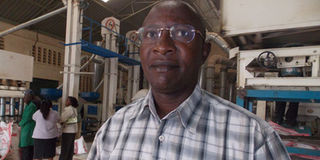Giant miller who plants hope in semi-arid region

PHOTO | CORRESPONDENT Mr Charles Njiru Kaburu.
What you need to know:
- From a humble tailor earning Sh3 for a pair of trousers, Kaburu rose to own matatus, lorries, super-markets and a Sh300 million rice factory, one of the largest private enterprises in Kenya
For Charles Njiru Kaburu, alias Mkombozi, the journey to success has been long and full of hurdles.
Mr Kaburu, 50, made it the hard way and now commands a multi-million shilling business empire which is the envy of many in Kirinyaga County.
He has risen from a simple tailor to a business tycoon who even attracted the attention of the Head of State.
He owns a company that trades in rice and is involved in the transport business.
The Sh300 million Nice Rice Millers Company, whose offices are in Ngurubani town, handles about 70 per cent of all the rice produced in the expansive Mwea Irrigation Scheme, the country’s rice granary.
Farmers deliver their produce to the company for milling and the place is always a hive of activity.
When Mr Kaburu completed Form Four in 1982, he did not continue with formal schooling due to poverty.
He looked for a white collar job in vain.
Frustrated, he enrolled for a tailoring course and when he completed it, he moved from one market to another seeking employment.
Luckily, he landed a job and worked for two years, after which he decided to start his own business of sewing clothes.
With the enthusiasm of a youthful entrepreneur, he bought materials and made clothes. But these were not selling fast enough and he eventually went broke.
He travelled to Nairobi where he was employed as a tailor on contract by a prominent Asian trader. Mr Kaburu earned Sh3 for making a pair of trousers and Sh1.50 for a shirt.
The payments were so poor that Mr Kaburu gave up and went back home, where he ventured into horticultural farming.
Although he was the pioneer of horticulture agri-business in the area, Mr Kaburu realised that farming was not doing well owing to poor prices.
After earning about Sh2,500 from selling tomatoes and french beans, he abandoned farming and vowed never to return to the business.
He bought a carton of farm chemicals and moved from one village to the other hawking them to green growers.
The chemicals sold fast. He continued buying more chemicals, which he distributed.
In six months, he had established an agro-chemical shop and bought a pick-up vehicle to make transporting pesticides easier.
Eventually, he bought an old matatu that plied the Makutano-Meru route.
His zeal even saw him build a supermarket 10 years ago.
Burnt his fingers
Mr Kaburu burnt his fingers many times along the way and rues having gone into the transport business, beginning with two 48-seater buses plying the Kerugoya-Nairobi route.
He was swindled by his crew and Mungiki extortionists and nearly went broke.
Fed up, he temporarily quit the business and invested in six 10-wheel lorries with which he tried his luck in the sand and building blocks trade in Nairobi.
Again, he was almost driven to bankruptcy by thieving crews, some of whom eventually bought their own lorries. He lost millions and was forced to sell the lorries for a song to a farmer in Narok.
Undeterred, he established a supermarket in Ngurubani, which is the second largest in the area today.
He then opened a rice mill — one of the largest private enterprises in the country and employs 600 people.
Mr Kaburu, who runs a chain of other businesses in the area, is now constructing a hotel.
He plans to make it attractive even to tourists visiting the county.
Due to his endeavours in business, former President Mwai Kibaki awarded him a State Commendation in 2011.
Awarded and recognized
The certificate reads: “I desire to record my high appreciation of the distinguished service to the Republic of Kenya. Therefore, I award you the State Commendation.”
The Food and Agriculture Organisation, a wing of the United Nations, has also awarded Mr Kaburu a certificate of recognition for his efforts that contribute to food security in Kenya.
Why the name Mkombozi (saviour)? In the early days, Mr Kaburu used to advance farm chemicals to poor farmers in the area on credit, after which they would pay after harvesting and selling their produce.
“They called me Mkombozi because they had not seen an individual giving credit to farmers before,” he said.
Nice Rice Factory has become a centre of interest, with visitors coming from Italy, America, and other parts of the world to learn how rice is processed.
Others tour the company to explore possibilities of converting rice husks into fuel for cooking.
“I receive many visitors from all over the world and it is interesting to see them asking all sorts of questions,” he said.
The company processes rice for sale to various parts of the country and offers milling services to farmers. It also offers transport services.
The father-of-three attributes his success to God and hard work.
His advice to young entrepreneurs is: Never give up.




